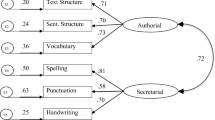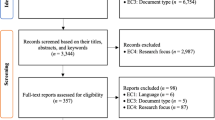Abstract
In a longitudinal study the development of reading and spelling abilities of 458 Viennese school children from the second until the eighth grade was analysed. Although the students’ level of performance displayed a great consistency with poor readers and spellers retaining their weaknesses, groups of students whose performance either improved or deteriorated with time were also identified. Not only cognitive prerequisites, but also the classroom behavior of the students and social factors proved to be significant for the long-term prognosis.
Similar content being viewed by others
References
Ackerman, P. T., Dykman, R. A., & Peters, J. E. (1977). Learning-disabled boys as adolescents: Cognitive factors and achievement.Journal of the American Academy of Child Psychiatry, 16, 296–313.
Ackerman, P. T., Dykman, R. A., & Peters, J. E. (1977). Teenage status of hyperactive and nonhyperactive learning disabled boys.American Journal of Orthopsychiatry, 47, 577–596.
Cox, T. (1987). Slow starters versus long-term backward readers.British Journal of Educational Psychology, 57, 73–86.
Douglas, J. W. B. (1964).The home and the school: A study of ability and attainment in the primary school. London: MacGibbon & Kee.
Forell, E. R., & Hood, J. (1985). A longitudinal study of two groups of children with early reading problems.Annals of Dyslexia, 35, 97–116.
Goswami, U. C., & Bryant, P. (1990).Phonological skills and learning to read. Hillsdale, NJ: Erlbaum.
Grimm, H., & Schöler, H. (1978).Heidelberger Sprachentwicklungstest. Braunschweig: G. Westermann Verlag.
Heller, K., Gaedecke, A. K., & Weinlder, H. (1985).Kognitiver Fähigkeits-Test KFT 4-13+. Deutsche Bearbeitung des ‘Cognitive-Abilities-Test’ von Thorndike, R. L., & Hagen, E. Weinheim: Beltz.
Kaplan, E. F., Goodglass, H., & Weintraub, S. (1978).Boston Naming Test. Experimental Edition.
Klicpera, C., Gasteiger-Klicpera, B., & Schabmann, A. (in press).Lesen und Schreiben — Entwicklung und Schwierigkeiten. Die Wiener Längsschnittuntersuchungen über die Entwicklung, den Verlauf und die Ursachen von Lese- und Schreibschwierigkeiten in der Pflichtschulzeit. Bern: Huber Verlag.
Kubinger, K. D., & Wurst, E. (1985).Adaptives Intelligenz-Diagnostikum. Weinheim: Beltz.
Linder, M., & Grissemann, H. (1980):Zürcher Lesetest. 4. Auflage. Bern: Huber.
Morris, J. M. (1966).Standards and progress in reading. Slough: National Foundation for Educational Research.
Oney, B., & Goldman, S. R. (1984). Decoding and comprehension skills in Turkish and English: Effects of the regularity of grapheme-pheneme correspondences.Journal of Educational Psychology, 76, 557–568.
Rosner, J., & Simon, D. P. (1971). The auditory analysis test: An initial report.Journal of Learning Disabilities, 4, 384–392.
Rutter, M., Tizard, J., Yule, W., Graham, P., & Whitmore, K. (1976). Research report: Isle of Wight studies 1964–1974.Psychological Medicine, 6, 313–332.
Satz, P., Taylor, H. G., Friel, J., & Fletcher, J. M. (1978). Some developmental and predictive precursors of reading disabilities: A six-year follow-up. In A. L. Benton, & D. Pearl (Eds.),Dyslexia: An appraisal of current knowledge, (pp. 315–347). New York: Oxford University Press.
Schenk-Danzinger, L. (1968).Handbuch der Legasthenie im Kindesalter. Weinheim: Beltz Verlag.
Schonhaut, S., & Satz, P. (1984). Prognosis for children with learning disabilities: A review of follow-up studies. In M. Rutter (Ed.),Developmental Neuropsychiatry. New York: Guilford.
Shankweiler, D., Crain, S., Brady, S., & Macaruso, P. (1992). Identifying the causes of reading disability. In P. B. Gough, L. C. Ehri, & R. Treiman (Eds.),Reading acquisition, (pp. 275–305). Hillsdale, NJ: L. Erlbaum.
Stanovich, K. E., & West, R. F. (1989). Exposure to print and orthographic processing.Reading Research Quarterly, 24, 402–433.
Thorstad, G. (1991). The effects of orthography on the acquisition of literacy skills.British Journal of Psychology, 82, 527–537.
Wagner, R., & Torgesen, J. (1987). The nature of phonological processing and its causal role in the acquisition of reading skills.Psychological Bulletin, 101, 192–212.
Watson, B. U., Watson, C. S., & Fredd, R. (1982). Follow-up studies of specific reading disability.Journal of the American Academy of Child Psychiatry, 21, 376–382.
Weyermüller, F., & Burgstaller, F. (1975).Diagnostischer Rechtschreibtest DRT2+, Wien: Ketterl Verlag.
Weyermüller, F., & Waitz, K. (1973).Diagnostischer Rechtschreibtest DRT3+. Wien: Ketterl Verlag.
Author information
Authors and Affiliations
Rights and permissions
About this article
Cite this article
Klicpera, C., Schabmann, A. Do German-speaking children have a chance to overcome reading and spelling difficulties? A longitudinal survey from the second until the eighth grade. Eur J Psychol Educ 8, 307–323 (1993). https://doi.org/10.1007/BF03174084
Received:
Issue Date:
DOI: https://doi.org/10.1007/BF03174084




